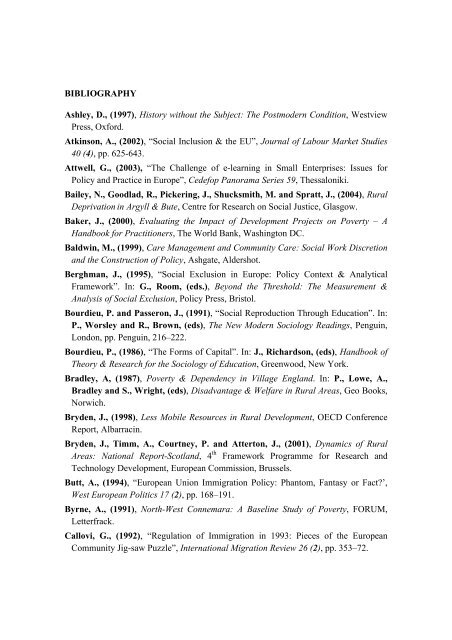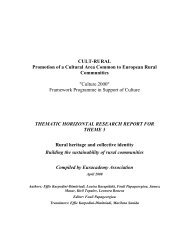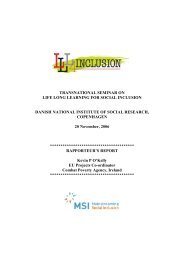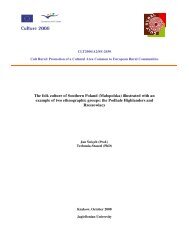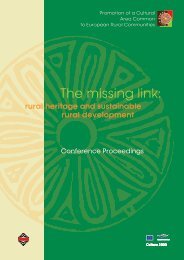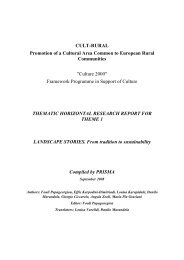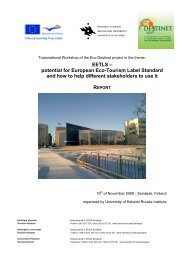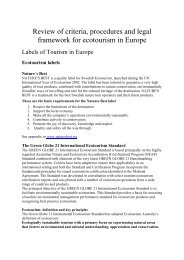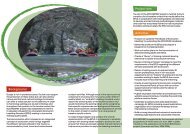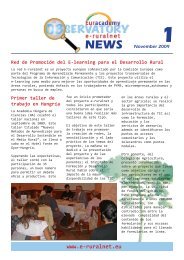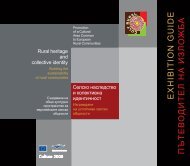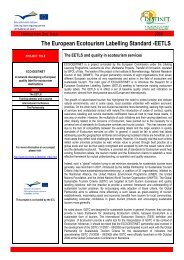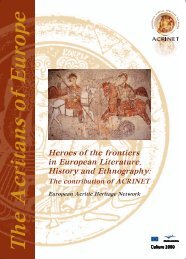Bibliography - Prisma Centre for Development Studies
Bibliography - Prisma Centre for Development Studies
Bibliography - Prisma Centre for Development Studies
Create successful ePaper yourself
Turn your PDF publications into a flip-book with our unique Google optimized e-Paper software.
BIBLIOGRAPHY<br />
Ashley, D., (1997), History without the Subject: The Postmodern Condition, Westview<br />
Press, Ox<strong>for</strong>d.<br />
Atkinson, A., (2002), “Social Inclusion & the EU”, Journal of Labour Market <strong>Studies</strong><br />
40 (4), pp. 625-643.<br />
Attwell, G., (2003), “The Challenge of e-learning in Small Enterprises: Issues <strong>for</strong><br />
Policy and Practice in Europe”, Cedefop Panorama Series 59, Thessaloniki.<br />
Bailey, N., Goodlad, R., Pickering, J., Shucksmith, M. and Spratt, J., (2004), Rural<br />
Deprivation in Argyll & Bute, <strong>Centre</strong> <strong>for</strong> Research on Social Justice, Glasgow.<br />
Baker, J., (2000), Evaluating the Impact of <strong>Development</strong> Projects on Poverty – A<br />
Handbook <strong>for</strong> Practitioners, The World Bank, Washington DC.<br />
Baldwin, M., (1999), Care Management and Community Care: Social Work Discretion<br />
and the Construction of Policy, Ashgate, Aldershot.<br />
Berghman, J., (1995), “Social Exclusion in Europe: Policy Context & Analytical<br />
Framework”. In: G., Room, (eds.), Beyond the Threshold: The Measurement &<br />
Analysis of Social Exclusion, Policy Press, Bristol.<br />
Bourdieu, P. and Passeron, J., (1991), “Social Reproduction Through Education”. In:<br />
P., Worsley and R., Brown, (eds), The New Modern Sociology Readings, Penguin,<br />
London, pp. Penguin, 216–222.<br />
Bourdieu, P., (1986), “The Forms of Capital”. In: J., Richardson, (eds), Handbook of<br />
Theory & Research <strong>for</strong> the Sociology of Education, Greenwood, New York.<br />
Bradley, A, (1987), Poverty & Dependency in Village England. In: P., Lowe, A.,<br />
Bradley and S., Wright, (eds), Disadvantage & Welfare in Rural Areas, Geo Books,<br />
Norwich.<br />
Bryden, J., (1998), Less Mobile Resources in Rural <strong>Development</strong>, OECD Conference<br />
Report, Albarracin.<br />
Bryden, J., Timm, A., Courtney, P. and Atterton, J., (2001), Dynamics of Rural<br />
Areas: National Report-Scotland, 4 th Framework Programme <strong>for</strong> Research and<br />
Technology <strong>Development</strong>, European Commission, Brussels.<br />
Butt, A., (1994), “European Union Immigration Policy: Phantom, Fantasy or Fact?’,<br />
West European Politics 17 (2), pp. 168–191.<br />
Byrne, A., (1991), North-West Connemara: A Baseline Study of Poverty, FORUM,<br />
Letterfrack.<br />
Callovi, G., (1992), “Regulation of Immigration in 1993: Pieces of the European<br />
Community Jig-saw Puzzle”, International Migration Review 26 (2), pp. 353–72.
Castles, S. and Kosack, G., (1980), “The Function of Labour Immigration in Western<br />
European Capitalism”. In: T., Nichols, (eds.), Capital & Labour, Fontana, Glasgow,<br />
pp. 117–138.<br />
CEDEFOP, (2001), Memorandum of Life-Long Learning Consultation: A Review of<br />
Member State & EEA Country Reports, CEDEFOP, Thessaloniki.<br />
CEDEFOP, (2002), Consultation Process on the EC’s Memorandum on LLL: Analysis<br />
of National Reports, CEDEFOP Panorama series 5127, Luxemburg.<br />
CEDEFOP, (2003), LLL: Citizens’ Views, CEDEFOP Series 4025, Luxemburg.<br />
CEDEFOP, (2007), Zooming in 2010: Reassessing Vocational Education & Training,<br />
Office <strong>for</strong> Official Publications of the European Communities, Luxembourg.<br />
CEDEFOP, (<strong>for</strong>thcoming), Feasibility of European Skill Needs, Office <strong>for</strong> Official<br />
Publications of the European Communities, Luxembourg.<br />
Cesarani, D. and Fulbrook, M., (1996), Citizenship, Nationality and Migration in<br />
Europe, Routledge, London.<br />
Chapman, P., Phimister, E., Shucksmith, M., Upward, R. and Vera-Toscano, E.,<br />
(1998), Poverty & Exclusion in Rural Britain: The Dynamics of Low Income &<br />
Employment, York Publishing Services, York.<br />
Chisholm, L., (2004), Getting to Work on LLL: Policy, Practice & Partnership:<br />
Summary Conference Report, CEDEFOP Panorama series 4033, Luxemburg.<br />
Chryssakis, M., (1989), “Family Investment Practices by the Poor & non poor and<br />
Educational Inequalities”, Revue of Sociological Research 75, pp. 89-120.<br />
Cini, M., (1996), The European Commission: Leadership, Organisation and Culture in<br />
the EU Administration, Manchester University Press, Manchester.<br />
Clayton, P., (1999), Vocational Guidance & Inclusion in LLL, [online]. Available at<br />
URL: http://www.open.ac.uk/lifelong-learning/papers/3937C33B-0000-6539-00000<br />
15700000157_PamClaytonPaper.doc. Accessed August 2005.<br />
Cloke, P. and Little, J., (1997), Contested Countryside Cultures: Otherness,<br />
Marginalisation & Rurality, Routledge, London.<br />
Cloke, P. and Milbourne, P., (1992), “Deprivation & Rural Lifestyles in Rural Wales<br />
II”, Journal of Rural <strong>Studies</strong> 8, pp. 360-374.<br />
Cloke, P., Goodwin, M., Milbourne, P. and Thomas, C., (1995), “Deprivation,<br />
Poverty & Marginalisation in Rural Lifestyles in England & Wales”, Journal of Rural<br />
<strong>Studies</strong> 11, pp. 351-365.<br />
Cloke, P., Milbourne, P. and Thomas, C., (1994), Lifestyles in Rural England, Rural<br />
<strong>Development</strong>, Commission Rural Research Report 18.<br />
Cohen, S., (1987), Visions of Social Control, Polity Press, Cambridge.<br />
1
Coleman, S. and Keep, E., (2001), Background Literature Review <strong>for</strong> PIU Project on<br />
Work<strong>for</strong>ce, PIU Cabinet Office, Innovation Unit, London.<br />
Commins, P. and Mernagh, M., (1998), Social Exclusion in Rural Europe – Some<br />
Lessons from the Poverty 3 Programme, EC, Brussels.<br />
Commins, P., (1993), Combating Exclusion in Ireland, 1990-94: A Midway Report,<br />
European Commission, Brussels.<br />
Commission of the European Communities, (2000a), A Memorandum on Life-Long<br />
Education & Training, SEC (2000) 1832, 30.10.2000, Brussels.<br />
Commission of the European Communities, (2000b), Communication from the<br />
Commission to the Council, the European Parliament, the Economic & Social<br />
Committee & the Committee of the Regions: Social Policy Agenda, COM (2004) 60,<br />
28.06.2000, Brussels.<br />
Commission of the European Communities, (2001a), Concrete Future Objectives of<br />
Education & Training, COM (2001) 59 final, 31.01.2001, Brussels.<br />
Commission of the European Communities, (2001b), Draft Detailed Work<br />
Programme <strong>for</strong> the Follow-up of the Report on the Concrete Objectives of Education<br />
& Training, COM (2001) 501 final, 07.09.2001, Brussels.<br />
Commission of the European Communities, (2001c), Structural Indicators, COM<br />
(2001) 619 final, 30.10.2001, Brussels.<br />
Commission of the European Communities, (2001d), Making a European Area of<br />
LLL a reality, COM (2001) 678 final, 01.11.2001, Brussels.<br />
Commission of the European Communities, (2002a), Proposals <strong>for</strong> Mid-Term<br />
Review of CAP, EU COM (394), Brussels.<br />
Commission of the European Communities, (2002b), Communication from the<br />
Commission to the Spring European Council in Barcelona, COM (2002) 14 final,<br />
15.01.2002, Brussels.<br />
Commission of the European Communities, (2002c), Work Programme on the<br />
Follow-up of the Objectives of Education & Training, 14.02.2002, Brussels.<br />
Commission of the European Communities, (2003), Joint Report on Social Inclusion<br />
Summarising the Results of the Examination of the NAPs <strong>for</strong> Social Inclusion (2003-<br />
2005), COM (2003) 773 final, 12.12.2003, Brussels.<br />
Commission of the European Communities, (2004a), Strengthening the Social<br />
Dimension of the Lisbon Strategy: Streamlining Open Co-ordination in the Field of<br />
Social Protection, COM (2003) 261 final, 27.03.2003, Brussels.<br />
Commission of the European Communities, (2004b), Scoreboard on Implementing<br />
the Social Policy Agenda, COM (2004) 137 final, 01.03.2004, Brussels.<br />
Commission of the European Communities, (2004c), Social Inclusion in the New<br />
Member States, SEC (2004) 848, 22.06.2004, Brussels.<br />
2
Commission of the European Communities, (2005a), Joint Report on Social<br />
Protection & Social Inclusion, SEC (2005) 69, 27.01.2005, Brussels.<br />
Commission of the European Communities, (2005b), Second Implementation Report<br />
on the 2003-2005 BEPGs, COM (2005) 8 final, 27.01.2005, Brussels.<br />
Commission of the European Communities, (2005c), Communication from the<br />
Commission on the Social Agenda, COM (2005) 33 final, 09.02.2005, Brussels.<br />
Commission of the European Communities, (2005d), Cohesion Policy in Support of<br />
Growth & Jobs: Community Strategic Guidelines 2007-2013, COM (2005) 0299,<br />
05.07.2005, Brussels.<br />
Commission of the European Communities, (2005e), Green Paper on an EU<br />
Approach to Managing Economic Migration, COM (2004) 811, 11.01.2005, Brussels.<br />
Commission of the European Communities, (2006a), European Social Fund Support<br />
to Education and Training- 2007-2013, ESF060603, Brussels.<br />
Commission of the European Communities, (2006b), Progress Towards the Lisbon<br />
Objectives in Education & Training: Report based on Indicators & Benchmarks<br />
Report 2006, SEC (2006) 639, 16.05.2006, Brussels.<br />
Commission of the European Communities, (2006c), European Social Fund Support<br />
to Education & Training- 2007-2013, ESF060603, Brussels.<br />
Commission of the European Communities, (2006d), Mission to the Council, the<br />
European Parliament, the Economic & Social Committee & the Committee of the<br />
Regions: Concerning a Consultation on Action at EU Level to Promote the Active<br />
Inclusion of the people Furthest from the Labour Market, COM (2006) 44, Brussels.<br />
Commission of the European Communities, (2007), Supporting Document of the<br />
Commission Staff Working Document, Joint Report on Social Protection and Social<br />
Inclusion, SEC (2007) 329, Brussels.<br />
Curtin, C, Haase, T. and Tovey, H., (1996), Poverty in Ireland, Oak Tree, Dublin.<br />
Curtin, C. and Varley, A., (1991), “Populism & Petty Capitalism in Rural Ireland”. In:<br />
S., Whatmore, (eds), Enterprise-Shifting Perspectives on Small-scale Production,<br />
David Fulton, London.<br />
Delors, J., (1996), Report to UNESCO of the International Commission on Education<br />
<strong>for</strong> the 21 st Century, UNESCO, Paris.<br />
Dennis I. and Guio, A., (2004), Poverty & Social Exclusion in the EU, Eurostat,<br />
Brussels.<br />
DG Employment and Social Affairs, (2004a), Report of the High Level Group on the<br />
Future of Social Policy in an Enlarged EU, Office <strong>for</strong> Official Publications of the<br />
European Communities, Luxemburg.<br />
DG Employment and Social Affairs, (2004b), Joint Report on Social Inclusion, Office<br />
<strong>for</strong> Official Publications of the European Communities, Luxembourg.<br />
3
DG Employment and Social Affairs, (2005), An Analysis of the NAPs on Social<br />
Inclusion (2004-2006) submitted by the 10 new Member States, Office <strong>for</strong> Official<br />
Publications of the European Communities, Luxembourg.<br />
Dovey, K., (1999), Mediating Power in Built Form, Routledge, London.<br />
Duffy, K., (1995), Social Exclusion & Human Dignity in Europe, Council of Europe,<br />
Brussels.<br />
EC, (1999), Council Regulation No 1783/1999 of the European Parliament and of the<br />
Council of 12 June 1999 on the European Regional <strong>Development</strong> Fund, Official<br />
Journal of the European Communities, Luxemburg.<br />
Elias, N. and Scotson, J., (1994), The Established & the Outsiders, Sage, London.<br />
Estivill, J., (2003), Concepts & Strategies <strong>for</strong> Combating Social Exclusion: An<br />
Overview, International Labour Office-STEP, Geneva.<br />
European Anti Poverty Network (EAPN), (2003), NAPs on Inclusion 2003-2005:<br />
Where is the Political Energy?, [online]. Available at URL: http://eapn.horus.be/<br />
code/en/publ_detail.asp?pk_id_content=444. Accessed March 2007.<br />
European Anti Poverty Network (EAPN), (2004), Response to the Joint Report on<br />
Social Inclusion adopted by the EC, [online]. Available at URL: http://www.eapn.<br />
org/code/en/publ_detail.asp?pk_id_content=814. Accessed August 2005.<br />
European Commission, (2002), Joint Report on Social Inclusion, Directorate-General<br />
<strong>for</strong> Employment and Social Affairs, EC, Brussels.<br />
European Commission, (2003a), Communication on Immigration, Integration &<br />
Employment, COM (2003) 336, Brussels.<br />
European Commission, (2003b), Education & Training 2010: Diverse Systems,<br />
Shared Goals: The Education & Training Contribution to the Lisbon Strategy,<br />
European Commission, Brussels.<br />
European Commission, (2003c), Implementation of ‘Education & Training 2010’<br />
Work Programme: Working Group ‘Mobility & European Cooperation’, Progress<br />
Report – November 2003, European Commission, Brussels.<br />
European Commission, (2003d), Implementation of ‘Education & Training 2010’<br />
Work Programme: Working Group ‘Basic Skills, Entrepreneurship & Foreign<br />
Languages’, Progress Report – November 2003, European Commission, Brussels.<br />
European Commission, (2004), Draft Joint Employment Report 2003/2004, COM<br />
(2004) 24, Brussels.<br />
European Council, (2000), European Council of Lisbon (23-24/03/00) – Conclusions<br />
of the Presidency, [online]. Available at URL: http://ue.eu.int/fr/info/eurocouncil/<br />
index.htm. Accessed August 2005.<br />
4
European Council, (2001), European Council of Stockholm (23-24/03/01) –<br />
Conclusions of the Presidency, [online]. Available at URL: http://ue.eu.int/fr/<br />
info/eurocouncil/index.htm. Accessed August 2005.<br />
European Council, (2002), Council Resolution of 27 June 2002 on Lifelong Learning,<br />
Official Journal of the European Communities, Luxemburg.<br />
European Foundation <strong>for</strong> the Improvement of Living and Working Conditions<br />
(EFILWC), (2002), LLL & Collective Bargaining, EIRO, Dublin.<br />
European Monitoring <strong>Centre</strong> on Racism & Xenophobia, (2004), Migrants,<br />
Minorities & Education, EMCRX, Vienna.<br />
Farrington, J., Gray, D., Martin, S. and Roberts, D., (1998), Car Dependence in<br />
Rural Scotland, Scottish Office Central Research Unit, Edinburgh.<br />
Ferrera, M., Hemerijk, A. and Rhodes, M., (2001), The Future of Social Europe:<br />
Recasting Work & Welfare in the New Economy, Ox<strong>for</strong>d University Press, Ox<strong>for</strong>d.<br />
Findlay, A., (1990), “A Migration Channels Approach to the Study of High-level<br />
Manpower Movements”, International Migration 28 (1), pp. 15–22.<br />
Findlay, A., Stockdale, A., Short, D., Findlay, A., Li, L. and Philip, L., (1999), The<br />
Impact of Migration in Rural Scotland, Central Research Unit, Edinburgh.<br />
Frawley, J., Commins, P., Scott, S. and Trace, F., (2000), Low Income Farm<br />
Households, Oak Tree, Dublin.<br />
Fryer, R., (1997), 1 st Report of the National Advisory Group <strong>for</strong> Continuing Education<br />
& LLL, NAG <strong>for</strong> Continuing Education & LLL, London.<br />
Gallent, N., Shucksmith, M. and Tewdwr-Jones, M., (2002), Housing in the<br />
European Countryside, Routledge, London.<br />
Galvin, J., (2006), The Role of Competencies & Qualifications Fostering Work<strong>for</strong>ce<br />
Mobility, Cedefop Seminar Series 2006, Thessaloniki.<br />
Geddes, A., (2000), Immigration & European Integration: Towards Fortress Europe,<br />
Manchester University Press, Manchester.<br />
Gellner, E., (1987), Culture, Identity & Politics, Cambridge University Press,<br />
Cambridge.<br />
Geoghegan, P., (2005), The EU We Want – Tackling Poverty & Exclusion in an<br />
Enlarged EU, [online]. Available at URL: http://eapn.horus.be/code/en/publ_detail.<br />
asp?pk_id_content=1192. Accessed August 2005.<br />
Gillborn, D. and Gipps, C., (1996), Recent Research on the Achievements of Ethnic<br />
Minority Pupils, HMSO-OFSTED, London.<br />
Gillborn, D. and Mirza, H., (2000), Educational Inequality: Mapping Race, Class &<br />
Gender – A Synthesis of Research Evidence, OFSTED, London.<br />
Grint, K., (1994), The Sociology of Work, Polity Press, Cambridge.<br />
5
Grootings, P., and Nielsen, S., (2006), ETF yearbook 2005: Professionals &<br />
Stakeholders in the Re<strong>for</strong>m of VET, EUR-OP ETF 2005, Luxembourg.<br />
Gsir, S. and Martinello, M., (2004), Local Consultative Bodies <strong>for</strong> Foreign Residents<br />
– A Handbook, Council of Europe, Brussels.<br />
Guibentif, P., (2004), Reception & Integration of Newly Arrived Immigrants – A<br />
Synthesis Report, [online]. Available at URL: http://www.peer-review-socialinclusion.net.<br />
Accessed August 2005.<br />
Halfacree, K., (1993), “Locality & Social Representation: Space, Discourse &<br />
Alternative Definitions of Rural, Journal of Rural <strong>Studies</strong> 9, pp. 23-37.<br />
Hall, S. and Du Gay, P., (1996), Questions of Cultural Identity, Sage, London.<br />
Handoll, J., (1995), Free Movement of Persons in the EU, Wiley & Sons, New York.<br />
Iversen, T. and Wren, A., (1998), “Equality, Employment & Budgetary Restraint: The<br />
Trilemma of the Service Economy”, World Politics 50, pp. 507-546.<br />
Jenkins, A., Vignoles, A., Wolf, A. and Galindo-Rueda, F., (2002), The Determinants<br />
& Effects of LLL, <strong>Centre</strong> <strong>for</strong> the Economics of Education, London.<br />
Jentsch, B. and Shucksmith, M., (2002), Young People in Rural Europe, Ashgate,<br />
Aldershot.<br />
Jones, G. and Jamieson, L., (1997), Young People in Rural Scotland: Getting on &<br />
Staying on Edinburgh, <strong>Centre</strong> <strong>for</strong> Educational Sociology, Edinburgh.<br />
Jordan, B., (1987), Rethinking Welfare, Blackwell, Ox<strong>for</strong>d.<br />
Kassimati, K., (2001), Structures & Flows: The Phenomenon of Social & Professional<br />
Mobility, Gutenberg, Athens.<br />
Kempson, E., Bryson, A. and Rowlingson, K., (1994), Hard Times? How Poor<br />
Families Make Ends Meet, Policy <strong>Studies</strong> Institute, London.<br />
Kestleloot, K., (1998), “The Geography of Deprivation in Brussels & Local<br />
<strong>Development</strong> Strategies”. In: S., Musterd and Ostendorf, W., (eds), Urban<br />
Segregation & the Welfare State, Routledge, London.<br />
Kirk, B. and Shucksmith, M., (1990), Rural Housing Market <strong>Studies</strong> – A Summary,<br />
Scottish Homes, Research Report No. 13, Edinburgh.<br />
Klasen, S., (1998), Social Exclusion & Children in OECD Countries: Some Conceptual<br />
Issues, OECD, Paris.<br />
Knack, S. and Keefer, P., (1997), “Does Social Capital Have an Economic Payoff?”,<br />
Quarterly Journal of Economics CXII, pp. 1251-1288.<br />
Kress, G., (2000), “Design and Trans<strong>for</strong>mation – New Theories of Meaning”. In: B.,<br />
Cope, and M., Kalantzis, (eds), Multiliteracies –Literacy Learning and the Design of<br />
Social Futures, Routledge, London.<br />
6
Krieger, H. and Fernandez, E., (2006), EU Policies to Promote & Restrict Mobility,<br />
Eurofound, Dublin.<br />
Lash, S. and Friedman, J., (1992), Modernity & Identity, Blackwell, Ox<strong>for</strong>d.<br />
Lash, S. and Urry, J., (1994), Economies of Signs & Space, Sage, London.<br />
Layard, R. and Psacharopoulos, G., (1974), “The Screening Hypothesis & the<br />
Returns to Education” Journal of Political Economy 82 (5), pp. 985-998.<br />
Lee, D. and Lee, T., (1995), “Human Capital & Economic Growth – Tests Based on<br />
the International Evaluation of Educational Achievement”, Economics Letters 47, pp.<br />
219-225.<br />
Lee, P. and Murie, A., (1997), Poverty, Housing Tenure & Social Exclusion, The<br />
Policy Press, Bristol.<br />
Lee, P. and Murie, A., (1999), Literature Review of Social Exclusion, The Scottish<br />
Office Central Research Unit, Edinburgh.<br />
Leisering, L. and Walker, R., (1998), The Dynamics of Modern Society: Poverty,<br />
Policy & Welfare, The Policy Press, Bristol.<br />
Levitas, R., (1999), Social exclusion & New Labour, Macmillan, London.<br />
Little, J. and Austin, P., (1996), “Women & the Rural Idyll”, Journal of Rural <strong>Studies</strong><br />
12, pp. 101-111.<br />
Lothian Anti Poverty Alliance, (2001), Working Together to End Poverty, SPIU<br />
Briefings, Briefing Sheet 13, April 2001.<br />
McLaughlin, B., (1986), Deprivation in Rural Areas, DOE, London.<br />
Meert, H., (2000), “Rural Community Life and the Importance of Reciprocal<br />
Strategies”, Sociologia Ruralis 40, pp. 319-338.<br />
Mernagh, M. and Commins, P., (1992), Europe 2000: Meeting the Challenge of<br />
Exclusion in Peripheral Rural Areas, Poverty 3 RDU, Dublin.<br />
Milbourne, P., (1997), Revealing Rural ‘Others’, Pinter, London.<br />
Modood, T., (2003), “Education: Differences between Ethnic Groups”. In: D., Mason,<br />
(eds), Explaining Ethnic Differences: Changing Patterns of Disadvantage in Britain,<br />
Policy Press, London.<br />
Namenwirth, J. and Weber, R., (1987), Dynamics of Culture, Allen, Winchester.<br />
Niessen, J. and Schibel, Y., (2004), Benchmarking Citizenship Policies, European<br />
Inclusion Index, Brussels.<br />
O’Hara, P., (1998), Local Participation in Rural <strong>Development</strong>, Rural Link, Galway.<br />
OECD, (2001), Investment in Human Capital Through Post-compulsory Education &<br />
Training, OECD Economic Outlook no 70, December 2001.<br />
OECD, (2006a), From Immigration to Integration – Local Solutions to a Global<br />
Challenge, OECD Publishing, Paris.<br />
7
OECD, (2006b), Where Immigrant Students Succeed – A Comparative Review of<br />
Per<strong>for</strong>mance & Engagement in PISA 2003, OECD Publishing, Paris.<br />
Ogbu, J., (1991), “Immigrants & Involuntary Minorities in Comparative Perspective”.<br />
In: M., Gibson and J., Ogbu, (eds), Minority Status & Schooling, Garland, London.<br />
Peck, J., (1996), Work Place: The Social Regulation of Labour Markets, The Guil<strong>for</strong>d<br />
Press, New York.<br />
Philip, L. and Shucksmith, M., (2003), “Conceptualising Social Exclusion in Rural<br />
Areas”, European Planning <strong>Studies</strong> 11 (4), pp. 461-480.<br />
PISA Report, (2000), Knowledge and Skills <strong>for</strong> Life – First Results from the OECD<br />
Programme <strong>for</strong> International Student Assessment, OECD, Paris.<br />
Porter, M., (1990), The Competitive Advantage of Nations, Free Press, New York.<br />
Portes, A., (1998), “Social Capital: Its Origins & Applications in Modern Sociology”,<br />
Annual Review of Sociology 24, pp. 1–24.<br />
Putnam, R., (1993), “The Prosperous Economy: Social Capital & Public Life,<br />
American Prospect 13, pp. 35-42.<br />
Reimer, W., (2004), “Social Exclusion in a Comparative Context”, Sociologia Ruralis<br />
44 (1), pp. 76-94.<br />
Room, G., (1994), Poverty <strong>Studies</strong> in the EU: Retrospect & Prospect, Policy <strong>Studies</strong><br />
Institute, London.<br />
Room, G., (1995), “Poverty & Social Exclusion: The New European Agenda <strong>for</strong> Policy<br />
& Research”. In: G., Room, (eds.), Beyond the Threshold: The Measurement &<br />
Analysis of Social Exclusion, Policy Press, Bristol.<br />
Rugg, J. and Jones, A., (1999), Getting a Job, Finding a Home: Rural Youth<br />
Transitions, The Policy Press, Bristol.<br />
Rutter, J., (2001), Supporting Refugee Children in the 21 st Century: A Compendium of<br />
Essential In<strong>for</strong>mation, Refugee Council, London.<br />
Shortall, S. and Shucksmith, M., (1998), “Integrated Rural <strong>Development</strong> in Practice:<br />
The Scottish Experience”, European Planning <strong>Studies</strong> 6 (1), pp. 73-88.<br />
Shucksmith, M. and Chapman, P., (1998), “Rural <strong>Development</strong> & Social Exclusion”,<br />
Sociologia Ruralis 38, pp. 225-242.<br />
Shucksmith, M., (1994), “Conceptualising Post-industrial Rurality. In: J., Bryden,<br />
(eds.), Towards Sustainable Rural Communities, University of Guelph, Guelph.<br />
Shucksmith, M., (2000), Exclusive Countryside? Social Inclusion & Regeneration in<br />
Rural Areas, Joseph Rowntree Foundation, York.<br />
Shucksmith, M., (2004), “Young People & Social Exclusion in Rural Areas”,<br />
Sociologia Ruralis 44 (1), pp. 43-59.<br />
8
Shucksmith, M., Chapman, P., Clark, G., Black, S. and Conway, E., (1994),<br />
Disadvantage in Rural Scotland: A Summary Report, Rural Forum, Perth.<br />
Shucksmith, M., Chapman, P., Clark, G., Black, S. and Conway, E., (1996), Rural<br />
Scotland Today: The Best of Both Worlds?, Avebury.<br />
Shucksmith, M., Roberts, D., Scott, D., Chapman, P. and Conway, E., (1997),<br />
Disadvantage in Rural Areas, Rural <strong>Development</strong> Commission 29, London.<br />
Shucksmith, M., Watkins, L. and Henderson, M., (1993), “Attitudes and Policies<br />
towards Residential <strong>Development</strong> in the Scottish Countryside”, Journal of Rural<br />
<strong>Studies</strong> 9, pp. 243-255.<br />
Sinfield, A., (2004), Preventing Poverty in Market Societies, ESPAnet Annual<br />
Conference, Ox<strong>for</strong>d.<br />
Smith, A., (1991), National Identity, Penguin, Harmondsworth.<br />
Social Protection Committee, (2001), Report on Indicators in the Field of Poverty &<br />
Social Exclusion, European Commission, Brussels.<br />
Spencer, S., (2003), The Challenges of Integration <strong>for</strong> the EU, Greek Presidency<br />
Conference, Athens.<br />
Steedman, H. and McIntosh, S., (2001), Measuring Low Skills in Europe: How Useful<br />
is the ISCED Framework?, London School of Economics, London.<br />
Stetter, S., (2000), “Regulating Migration: Authority Delegation in Justice & Home<br />
Affairs”, Journal of European Public Policy 7 (1), pp. 81–103.<br />
Sultana, R., (2004), Guidance Policies in the Knowledge Society: Trends, Challenges<br />
& Responses Across Europe, CEDEFOP Panorama series 5052, Luxemburg.<br />
Tessaring, M. and Descy, P., (2001a), Training in Europe: 2 nd Report on Vocational<br />
Training Research in Europe 2000, Office <strong>for</strong> Official Publications of the European<br />
Communities, Luxemburg.<br />
Tessaring, M. and Descy, P., (2001b), Training in Europe: Synthesis Report, Office<br />
<strong>for</strong> Official Publications of the European Communities, Luxemburg.<br />
Tett, L., (2005), Adult Basic Education & Social Inclusion, [online]. Available at<br />
URL:http://www.creid.ac.uk/events/BERA140305/BERASeminar _PaperLTett.doc.<br />
Accessed August 2005.<br />
Thursfield, D. and Henderson, R., (2004), ‘Participation in LLL: Reality or Myth?’,<br />
Journal of Vocational Education & Training 56 (1), pp.117-134.<br />
Tilly, C. and Tilly, C., (1998), Work Under Capitalism, Westview Press, Ox<strong>for</strong>d.<br />
Townsend, P., (1987), “Disadvantage”, Journal of Social Policy 16, pp. 125-146.<br />
UN Economic and Social Council, (2003), Poverty Reduction Practices: ESCAP<br />
Strategies in Poverty Reduction – Transfer of Good & Innovative Practices,<br />
E/ESCAP/CPR/3, UN Economic and Social Council.<br />
9
Vandenbrande, T., (2006), Mobility in Europe: Analysis of the 2005 Eurobarometer<br />
Survey on Geographical & Labour Market Mobility, EUR-OP 2006, Luxembourg.<br />
Wessels, W. and Rometsch, D., (1996), The EU & the Member States: Towards<br />
Institutional Fusion?, Manchester University Press, Manchester.<br />
Woodward, R., (1996), “Deprivation & the ‘Rural’: An Investigation into<br />
Contradictory Discourses”, Journal of Rural <strong>Studies</strong> 12, pp. 55-67.<br />
Zeitlin, J., (2005), The Open Method of Coordination in Action: The European<br />
Employment & Social Inclusion Strategies, P.I.E., Brussels.<br />
10
HUNGARIAN REFERENCES & BIBLIOGRAPHY<br />
Bardócz, A., (1999), “Mi bajotok az iskolával?”, Új Pedagógiai Szemle 10, pp. 96–9.<br />
Bass, L., Ferge, Z. and Márton, I., (2003), Gyorsjelentés a Szegényedésről 2000–<br />
2003: A Szociális Szakmai Szövetség Jelentése Szociális Munkások Beszámolói<br />
Alapján, Szociális Szakmai Szövetség, Budapest.<br />
Budai, Á., (2000), “Az Egész Eleten át Tartó Tanulás”, Új Pedagógiai Szemle 11, pp.<br />
107–121.<br />
Darvas, Á. and Tausz, K., (2003), Gyermekszegénység és Társadalmi Kirekesztődés,<br />
ICSSZEM, Budapest.<br />
Dögei, I. and Ferge, Z., (2002), A Szubjektív Szegénység és Néhány Társadalmi Erték<br />
Megítélése – Az Allam Szerepe, Esély, Budapest.<br />
Egedy, T., (2001), Szegregáció és Társadalmi Kirekesztés a Nagyvárosi Lakótelepeken,<br />
Társadalom, Budapest.<br />
Emigh, R. and Szelényi, I., (2001), Poverty, Ethnicity and Gender in Eastern Europe<br />
During the Market Transition, Praeger Pub. Trade, Budapest.<br />
Falussy, B., (200l), A Felnőttkori Tanulás, Onképzés Változásai, Jelenlegi Feltételei és<br />
Körülményei a KSH Időmérleg-életmód Felvételei Alapján, OKI, Budapest.<br />
Ferge, Z., (2000), “Poverty in Hungary & in Central and Eastern Europe”. In: D.,<br />
Gordon and P., Townsend, (eds.), Breadline Britain – The Measurement of Poverty,<br />
The Policy Press, Bristol.<br />
Ferge, Z., (2002), “Struktúra és Egyenlőtlenségek a Régi Allamszocializmusban és az<br />
Ujkapitalizmusban”, Szociológiai Szemle 4, pp. 9-33.<br />
Ferge, Z., Simonyi, Á. and Dögei, I., (2002), PSS Country Report <strong>for</strong> Hungary, Part of<br />
the People's Security Surveys – PSS, International Labour Office, Geneva.<br />
Ferge, Z., Tausz, K. and Darvas, Á., (2002), Küzdelem a Szegénység és a Társadalmi<br />
Kirekesztés Ellen, Nemzetközi Munkaügyi Hivatal Közép, Budapest.<br />
Fóti, K., (2003), A Szegénység Enyhítéséért – Helyzetkép és Javaslatok 2000–2002,<br />
Magyar Tudományos Akadémia Világgazdasági Kutatóintézet, Budapest.<br />
Füleki, D., (2001), “A Társadalmi Kirekesztés és Befogadás Indikátorai”, Szociológiai<br />
Szemle 2, pp. 84 – 95.<br />
Györgyi, Z., (2004), A Magyarországi Felnőttképzés, Oktatáskutató, Budapest.<br />
Hadas, M., (1994), Férfiuralom, Replika, Budapest.<br />
Hajdú, Z., (1993), ”Település és Településhálózat-fejlesztési Politika Magyarországon<br />
az Allamszocializmus Időszakában”. In: G., Enyedi, (eds), Társadalmi-területi<br />
egyenlőtlenségek Magyarországon, KJK, Budapest.<br />
11
Harangi, L., (2003), “A ‘Lifelong Learning’ Paradigma és Hatása a Magyar<br />
Közoktatásra”. In: J., Mayer and P., Singer, (eds), A Tanulás Kora, Országos<br />
Közoktatási Intézet, Budapest.<br />
Havas, G., Kemény, I. and Liskó, I., (2002), Cigány Gyerekek az Altalános Iskolában,<br />
OKI – Új Mandátum, Budapest.<br />
Havasi, É., (2002), “Szegénység és Társadalmi Kirekesztettség a mai<br />
Magyarországon”, Szociológiai Szemle 4, pp. 51–71.<br />
Horváth G. and Rechnitzer, J., (2001), Magyarország Területi Szerkezete és<br />
Folyamatai az Ezred<strong>for</strong>dulón, MTA RKK, Pécs.<br />
Horváth, Á., Landau, E. and Szalai, J., (2000), Cigánynak Születni, ATA – Új<br />
Mandátum, Budapest.<br />
Kertesi, G. and Kézdi, G., (1998), A Cigány Népesség Magyarországon, Socio-tipo,<br />
Budapest.<br />
Kertesi, G., (1994), Cigányok a Munkaerőpiacon, Közgazdasági Szemle, Budapest.<br />
Kertesi, G., (1995), Cigány Foglalkoztatás és Munkanélküliség a Rendszerváltás Előtt<br />
és Után, Esély, Budapest.<br />
Kertesi, G., (2004), The Employment of the Roma–Evidence from Hungary, BWP,<br />
Budapest.<br />
Krémer, B., (2003), Uniós Politikák és Nemzeti Akciótervek a Szegénység és a<br />
Társadalmi Kirekesztettség Elleni Küzdelemre, Miniszterelnoki Hivatal Kormanytazi<br />
Strategiai Elemzo Kozpont, Stratégiai Füzetek 15, Stratek.<br />
KSH, (1998), A Szegények Jellemzői a Mai Magyarországon, KSH, Budapest.<br />
KSH, (1999), A Segélyezett Háztartások Eletkörülményei, KSH, Budapest.<br />
KSH, (2002), A Munkahelyi képzések Főbb Adatai. KSH, Budapest.<br />
KSH, (2004), Az Elethosszig Tartó Tanulás, KSH, Budapest.<br />
Laky, T., (2004), A Magyarországi Munkaerőpiac 2004, Országos Foglakoztatási<br />
Közalapítvány, Budapest.<br />
Lelkes, O., (2003), “A Társadalmi Kirekesztés Mérése az Európai Unióban és<br />
Magyarországon”, Szociológiai Szemle 4, pp. 88–106.<br />
Magyar Köztársaság Kormánya, (2003), Szakképzés-fejlesztési Stratégia 2013, OKM,<br />
Budapest.<br />
Magyar Köztársaság Kormánya, (2005), A Magyar Köztársaság Kormányának<br />
Stratégiája az Egész Eleten át Tartó Tanulásról, OKM, Budapest.<br />
Molnár, E., (2004), Cigány Kisebbségi Onkormányzatok, BKÁE, Budapest.<br />
Monostori, J., (2004), “Konferenciaismertető a Társadalmi Kirekesztésről”,<br />
Szociológiai Szemle 2, pp. 96–101.<br />
12
MWA, (2000), The Social History of Poverty in Central Europe, Max Weber<br />
Alapítvány, Budapest.<br />
Nagy, B., (2003), G(ender) G(eneration) G(ap): Kirekesztés vagy Befogadás, BKE<br />
Szociológia Tanszék, Budapest.<br />
Neményi, M., (1999), Csoportkép Nőkkel, Új Mandátum, Budapest.<br />
Nemes, N., (2002), “Szigetek a Társadalmi Térben”. In: P., Abonyiné, J., Becsei and<br />
J., Kovács, (eds), A Magyar Társadalomföldrajzi Kutatás Gondolatvilága, SZTE,<br />
Szeged.<br />
OKI, (2002), Cigány Tanulók a Középfokú Iskolákban. OKI, Budapest.<br />
Setényi, J., (2004), “Élethossziglani Tanulás: Az új Paradigma”. In: B., Kósa, A.,<br />
Monostori and M., Simon, (eds), Nyitott Iskola – Tanuló Társadalom, Országos<br />
Közoktatási Intézet konferenciája, Országos Közoktatási Intézet.<br />
Sik, E. and Tóth, I., (1997), Az Ajtók Záródnak, TÁRKI, Budapest.<br />
Spéder, Z., (2002), A Szegénység Változó Arcai, Századvég Kiadó, Budapest.<br />
Szalai, J., (2002), “A Társadalmi Kirekesztődés Egyes Kérdései az Ezred<strong>for</strong>duló<br />
Magyarországán”, Szociológiai Szemle 4, pp. 34–50.<br />
Szígyártó, G. and Peresztegi, É., (2002), Iskolarendszeren Kívüli Szakképzés<br />
Statisztikai Adatai, OSAP¸ Budapest.<br />
Tót, É., (2005), Az Elethosszig Tartó Tanulás Lehetőségei Magyarországon,<br />
Felsőoktáskutató Intézet (Kézirat, FKI-Dokumentáció), Budapest.<br />
Utasi, Á., (2002), A Bizalom Hálója, Új Mandátum, Budapest.<br />
Vágó, I., (2003), “Az LLL Fogalmának Ertelmezési Lehetőségei a Közoktatásban”. In:<br />
J., Mayer and P., Singer, (eds), A Tanulás Kora, Országos Közoktatási Intézet.<br />
Zoltán, G., (2004), A Magyarországi Felnőttképzés, OECD, Paris.<br />
Zsarnai, S., (2002), “Az Iskolarendszeren Kívüli Képzés Magyarországon”. In: P.,<br />
Singer, (eds), Felnőttoktatás és Képzés az Iskolarendszerben és Azon Kívül, OKI,<br />
Budapest.<br />
13
GREEK REFERENCES & BIBLIOGRAPH.<br />
Baganha, M. and Fonseca, M., (2004), New Waves: Migration from Eastern Europe to<br />
Southern Europe, Luso-American Foundation, Lisbon.<br />
Brown, A., (2005), Learning While Working in Small Companies: Comparative<br />
Analysis of Experiences Drawn from England, Germany, Greece, Italy, Portugal and<br />
Spain, Ox<strong>for</strong>d and Warwick University Press, Ox<strong>for</strong>d.<br />
Buhalis, D. and Deimezi, O., (2003), “In<strong>for</strong>mation Technology Penetration and Ecommerce<br />
<strong>Development</strong>s in Greece, Electronic Markets 13 (4), pp. 309-324.<br />
Cavounidis, J., (2002), “Migration in Southern Europe and the Case of Greece”,<br />
International Migration 40 (1), pp. 45-69.<br />
CEDEFOP, (2004), Getting to Work on Life Long Learning, Summary Conference<br />
Report, Office <strong>for</strong> Official Publications of the European Communities, Luxemburg.<br />
Dagdilelis, V., Satratzemi, M., Evangelidis, G., (2003), “Implementing a Nationwide<br />
Systems <strong>for</strong> Training Very Small Enterprises <strong>for</strong> ICT Innovation: The Greek Case”,<br />
Educational Technology and Society 6 (1), pp. 26-31.<br />
De Zulueta, T., (2003), Migrants in Irregular Employment in the Agricultural Sector of<br />
Southern European Countries, Council of Europe, Brussels.<br />
Diamanti, P., (2003), “Migration of Ethnic Greeks from the Former Soviet Union to<br />
Greece, 1990-2000”, Southeast European and Black Sea <strong>Studies</strong> 3 (1), pp. 25-45.<br />
EC, (1999), Social Protection in the Member States of the EU – Situation on January<br />
1999 and Evolution, DGV Unit V/E/2, Brussels.<br />
EKEP, (2006), National <strong>Centre</strong> <strong>for</strong> Vocational Orientation, [online]. Available at URL:<br />
http://www.ekep.gr. Accessed October 2006.<br />
EQUAL, (2006), Support of the Adaptability of SME Workers in North-Eastern Greece,<br />
[online]. Available at URL: https://equal.cec.eu.int/equal/jsp/dp<br />
Complete.jsp?cip=GR&national=200764#ascii. Accessed June 2006.<br />
Eurostat, (2000), The Social Situation in the European Union, Eurostat, Luxemburg.<br />
Eurostat, (2003), Growth Rate of GDP (1995-2001), Eurostat, Luxemburg.<br />
Fakiolas, R., (1997), Recent Ef<strong>for</strong>ts to Regularise Undocumented Immigrants,<br />
EFILWC, Dublin.<br />
GSAE, (2006), General Secretariat of Adult Education, [online]. Available at URL:<br />
http://www.gsae.edu.gr/. Accessed October 2006.<br />
HAEA, (2006), Hellenic Adult Education Association, [online]. Available at URL:<br />
http://www.adulteduc.gr/001/index.php?option=com_content&task=view&id=28&Ite<br />
mid=43. Accessed October 2006.<br />
Hatziprokopiou, P., (2003), “Albanian Immigrants in Thessaloniki”, Journal of Ethnic<br />
and Migration <strong>Studies</strong> 29 (6), pp. 1033-1057.<br />
14
IMEPO, (2004), Report on Immigration – The Greek Case, IMEPO, Athens.<br />
In<strong>for</strong>mation Society, (2002), Greece in the In<strong>for</strong>mation Society - Strategy and Actions,<br />
Office of the Greek Prime Minister, Athens.<br />
Jordan, B., Streth, B. and Triandafyllidou, A., (2003a), “Comparing Cultures of<br />
Discretion”, Journal of Ethnic and Migration <strong>Studies</strong> 29 (2), pp. 373-97.<br />
Jordan, B., Streth, B. and Triandafyllidou, A., (2003b), “Contextualising<br />
Immigration Policy Implementation in Europe”, Journal of Ethnic and Migration<br />
<strong>Studies</strong> 29 (2), pp. 195-224.<br />
Kasimis, C. and Kassimi, C., (2004), Greece: A History of Migration, Migration<br />
In<strong>for</strong>mation Source, Washington.<br />
Kasimis, C., (2005), “The New Role of Migrants in the Rural Economies of Southern<br />
Europe”. In: D., Papademetriou, (eds), Managing Migration: a Policy Agenda <strong>for</strong><br />
Economic Progress and Social Cohesion, Migration Policy Institute, Washington.<br />
Kasimis, C., Nitsiakos, V., Zacopoulou, E. and Papadopoulos, A., (2002), The<br />
Implications of the Settlement and Employment of Migrant Labor in Rural Greece,<br />
Universities of Patras and Ioannina, Patras.<br />
King, R., (2000), “Southern Europe in the Changing Global Map of Migration”. In: R.,<br />
King, G., Lazaridis, and C., Tsardanidis, (eds), Eldorado or Fortress? Migration in<br />
Southern Europe, MacMillan Press, London.<br />
Kiprianos, P., Balias, S. and Passas, V., (2003), “Greek Policy towards Immigration<br />
and Immigrants”, Social Policy and Administration 37 (2), pp. 148-64.<br />
Kokkos, A., (2005), Adult Education: Exploring the Field, Metaichmio, Athens.<br />
Kokosalakis, N., (2000), “Lifelong Learning & the Universities in Greece: A State of<br />
the Art”, European Journal of Education 35 (3), pp. 330-342.<br />
Kosmidou, M., (2001), Lifelong Learning, ICT and Elderly People: A Study of 2<br />
Countries, Dissertation submitted in partial fulfilment of the requirements <strong>for</strong> the<br />
degree of MSc in In<strong>for</strong>mation Management, University of Sheffield, UK.<br />
Lianos, T., (2001), “Illegal Migrants to Greece & their Choice of Destination”,<br />
International Migration 39 (2), 3-28.<br />
Lianos, T., Sarris, A. and Katseli, L., (1996), “Illegal Immigration & Local Labour<br />
Markets: The Case of Northern Greece”, International Migration 34 (3), pp. 449-84.<br />
Lykovardi, K. and Petroula, E., (2003), “Greece”. In: J., Niessen, Y., Schibel and R.,<br />
Magoni, (eds), EU and US Approaches to the Management of Immigration, Migration<br />
Policy Group, Brussels.<br />
Millar, J. and Warman, A., (1995), “Defining Family Obligations in Europe”, Social<br />
Policy Papers No. 23, pp. 129-153.<br />
Marvakis, A., Parsanoglou, D. and Pavlou, M., (2001), Immigrants in Greece,<br />
Ellinika Grammata, Athens.<br />
15
Ministry of Education and Religious Affairs, (2006), In<strong>for</strong>mation Society Office,<br />
[online]. Available at URL: http://www.ypepth.gr/ktp/en_home.htm. Accessed<br />
October 2006.<br />
Ministry of Labour, (2003), Proceedings of the Roundtable of the Working Group on<br />
Life-Long Learning, National Coordination Unit of ESF (EYSEKT), Athens.<br />
Moussourou L., (1994), “Family Policy in Greece: Traditional & Modern Patterns”. In:<br />
D., Dumon, (eds), Changing Family Policies in the Member States of the EU,<br />
Commission of the European Union, Brussels.<br />
Moussourou L., (1995), “Greece: Issues Concerning the Family in 1995”. In:<br />
Observatory on National Family Policies, (eds), A Synthesis of National Family,<br />
European Commission, Luxembourg.<br />
National Institute of Labour, (2001), Methods of Recognition and Accreditation of<br />
Skills and Knowledge Obtained Through Non-<strong>for</strong>mal Education, National Institute of<br />
Labour, Athens.<br />
National Statistical Service of Greece, (2001), Preliminary Results of the Census of<br />
Agriculture and Livestock 1999/2000 & General Conclusions, ESYE, Athens.<br />
Psimmenos, I. and Kassimati, K., (2002), The Greek case: Immigration Control<br />
Pathways, RSCAS-IAPASIS Reports, Athens.<br />
Sitaropoulos, N., (2003), Immigration Law & Management in Greece, Sakkoulas,<br />
Athens.<br />
Skourtou, E., Cummins, J., Kourtis, K. and Kazoullis, B., (2003), “Designing<br />
Virtual Learning Environments <strong>for</strong> Academic Language <strong>Development</strong>”. In: J., Weiss,<br />
J., Nolan and P., Trifonas, (eds), International Handbook of Virtual Learning<br />
Environments, Kluwer Academic Publishers, Amsterdam.<br />
Sotiropoulos, D., (2004), Formal Weakness and In<strong>for</strong>mal Strength: Civil Society in<br />
Contemporary Greece, The Hellenic Observatory – LSE, Athens.<br />
Triandafyllidou, A., (1996), “Greek Migration Policy: A Critical Note’, Synthesis:<br />
Review of Modern Greek <strong>Studies</strong> 1(1), pp. 15-22.<br />
Triandafyllidou, A., (2000a), A Theoretical and Methodological Introduction to the<br />
Study of Organisational Culture, European University Institute, Florence.<br />
Triandafyllidou, A., (2000b), “The Political Discourse on Immigration in Southern<br />
Europe: A Critical Analysis”, Journal of Community and Applied Social Psychology<br />
10 (5), pp. 373–89.<br />
Triandafyllidou, A., (2001), Immigrants & National Identity in Europe, Routledge,<br />
London.<br />
Triandafyllidou, A., (2002a), “Greece”. In: J., Wal, (eds), Racism & Cultural<br />
Diversity in the Mass Media – An Overview of Research & Examples of Good<br />
Practice in the EU Member States, 1995-2000, EUMC, Vienna.<br />
16
Triandafyllidou, A., (2002b), Negotiating Nationhood in a Changing Europe: Views<br />
from the Press, Edwin Mellen Press, Washington, DC.<br />
Tsoukalas, K., (1999), State, Society, Labour in Post-war Greece, Themelio, Athens.<br />
Verelis, C., Paschalidis, G. and Christodoulakis, N., (2000), Issues of Remodernisation,<br />
Kastaniotis, Athens.<br />
17
DANNISH REFERENCES & BIBLIOGRAPHY<br />
Abrahamson, P., (1998), Post-modern Governing of Social Exclusion: Social<br />
Integration or Risk Management, Københavns Universitet, Copenhagen.<br />
Andersen, D., (2005), Do Young People with Poor Reading Skills Complete an upper<br />
Secondary Education?, Social<strong>for</strong>skningsinstituttet, Copenhagen.<br />
Andersen, H., (2005), Ethnic Minorities in Social Deprived Residential Areas,<br />
Social<strong>for</strong>skningsinstituttet, Copenhagen.<br />
Blume, K., Björn, G., Peder, P. and Mette, V., (2005), “At the Lower end of the<br />
Table: Determinants of Poverty among Immigrants to Denmark and Sweden”, IZA<br />
Discussions Papers No. 1551.<br />
Boyd, S. and Latomaa, S., (1996), “Language Contact in the Nordic Region”, Nordic<br />
Journal of Linguistics 19 (2), pp. 155-182.<br />
Boyd, S., Holmen, A. and Jørgensen, J., (1994), Language Use & Choice Among<br />
Immigrants in the Nordic Region, Royal Danish School of Education, Copenhagen.<br />
Colding, B., (2005), “En Sammenligning af Udlændinges og Danskere Karakterer fra<br />
Folkeskolens Afgangsprøver og på de Gymnasiale i Uddannelser”, Ministeriet <strong>for</strong><br />
Flygtninge, Copenhagen.<br />
Colding, B., Hummelgaard, H. and Husted, L., (2004), “Indvandrere og<br />
Efterkommeres Uddannelse”, Ministeriet <strong>for</strong> Flygtninge, Copenhagen.<br />
Dahl, K. and Jakobsen, V., (2005), Gender, Ethnicity & Barriers <strong>for</strong> Integration –<br />
Focus on Education, Work & Association Activities, Social<strong>for</strong>skningsinstituttet,<br />
Copenhagen.<br />
Dahl, K., (2005), Ethnic Minorities in Number, Social<strong>for</strong>skningsinstituttet,<br />
Copenhagen.<br />
Egelund, N. and Schindler, B., (2005), PISA Copenhagen 2004, AKF Forlaget,<br />
Copenhagen.<br />
Emerek, R., (2003), Integration or Exclusion? The Danish Debate on Integration,<br />
AMID Woking Paper Series 31/2003.<br />
Goul-Andersen, J., (2002), “Coping with Long-term Unemployment: Economic<br />
Security, Labour Market Integration & Well-being”, International Journal of Social<br />
Welfare 11, pp. 178-190.<br />
Holmen, A. and Risager, K., (2003), “Language & Culture Teaching – Foreign<br />
Languages & Danish as a Second Language”, International Journal of the Sociology<br />
of Language 159, pp. 93-108.<br />
Hussain, M., (2004), Child Poverty in Denmark 2002: The Dynamics of Poverty,<br />
Social<strong>for</strong>skningsinsituttet, Copenhagen.<br />
18
Illeris, K., (2003), “Adult Education as Experienced by Learners”, International<br />
Journal of Lifelong Learning 22, pp. 13-23.<br />
Järvinen, M., (2004), Refugees & Immigrants, Hans Reitzels Forlag, Copenhagen.<br />
Jensen, U. and Tovby, B., (2005), “Det Vigtigste i Livet er at få en Uddannelse”,<br />
Ministeriet <strong>for</strong> Flygtninge, Copenhagen.<br />
Jensen, V., (2004), LOKK Yearly Statistics 2004, Socialt Udsatte, Copenhagen.<br />
Jeppesen, K. and Nielsen, A., (1998), Ethnic Minority Children, Danish National<br />
Institute of Social Research, Copenhagen.<br />
Jeppesen, K. and Nielsen, A., (2001), Bilingual Young Children in Denmark,<br />
Social<strong>for</strong>skningsinstituttet, Copenhagen.<br />
Knoop, H., (2001), Lifelong Learning – Human Right or Political Demand,<br />
Undervisningsministeriet, Copenhagen.<br />
Larsen, J., (2004), Poverty & Social Exclusion, Social<strong>for</strong>skningsinstituttet,<br />
Copenhagen.<br />
Lundvall, B. and Nielsen, P., (2001), “New Demands on the <strong>Development</strong> in Skills”.<br />
In: J., Andersen and P., Jensen, (eds), Marginalisation, Integration and Welfare,<br />
Aalborg Universitets<strong>for</strong>lag, Aalborg.<br />
Ministry of Education, (1999), Review on Education, Ministry of Education,<br />
Copenhagen.<br />
Ministry of Finance, (2004), The Low-income Group – Mobility & Composition,<br />
Ministry of Finance, Copenhagen.<br />
Ministry of Social Affairs, (2003), NAPincl 2003/2005 – Denmark’s NAP to Combat<br />
Poverty and Social Exclusion, Ministry of Social Affairs, Copenhagen.<br />
Ministry of Social Affairs, (2005), Implementation & Update Report on the<br />
NAP/inclusion 2003-2005, Ministry of Social Affairs, Copenhagen.<br />
Møller, B. and Togeby, L., (1999), Experienced Discrimination, Nævnet <strong>for</strong> Etnisk<br />
Ligestilling, Copenhagen.<br />
Pedersen, S., (2000), “Transfer Payments to Immigrants”. In: Mogensen, V. and<br />
Matthiessen, P., (eds), Integration in Denmark in 2000, Aarhus University Press,<br />
Aarhus.<br />
Rasmussen, P., (2002), “Education <strong>for</strong> Everyone: Secondary Education & Social<br />
Exclusion”, Journal of Educational Policy 17, pp. 627-642.<br />
Tuijnman, A. and Hellström, Z., (2001), Curious Minds: Nordic Adult Education<br />
Compared, Nordisk Ministerr, Copenhagen.<br />
Wadensjo, E., (2000), “Immigration, Income Distribution & Wages”. In: Mogensen,<br />
V. and Matthiessen, P., (eds), Integration in Denmark in 2000, Aarhus University<br />
Press, Aarhus.<br />
19
POLISH REFERENCES & BIBLIOGRAPHY<br />
Aleksander, T., (2002), “Ewolucja Systemu Pozaszkolnej Edukacji Zawodowej<br />
Doroslych w Zmieniajacej sie Rzeczywistosci Spoleczno-gospodarczej”. In: E.,<br />
Wesolowska, (eds), “Edukacja Doroslych w Erze Globalizmu”, Plock 2002, pp. 351-<br />
362.<br />
Auleytner, J., (1999), LLL links between West and Central Europe, Elipsa, Warsaw.<br />
Bauman, Z., (1998), “Zbedni, Niechciani, Odtraceni – Czyli o Biednych w Zamoznym<br />
Swiecie”, Kultura i Spoleczenstwo 2, pp. 3-18.<br />
Bednarski, M. and Szatur, B., (1999), Wskazniki Spoleczne Jako Narzedzia Pomiaru<br />
Skutecznosci i Efektywnosci Polityki Spolecznej, IPiSS, Warsaw.<br />
Blad, M., (2003), “Wspieranie Rozwoju Obszarow Wiejskich na Przykladzie<br />
Lubelskiej Inicjatywy Rozwoju Wsi”, Wies i Rolnictwo 3, pp. 141-155.<br />
Blad, M., (2004), “Czynniki i Symptomy Marginalizacji na Obszarach Wiejskich w<br />
Polsce”, Zagadn. Doradz. Roln. 1, pp. 67-76.<br />
Bogaj, A., Kwiatkowski, S. and Piwowarski, R., (2001), Wskazniki Edukacyjne:<br />
Polska 2000, IBE, Warsaw.<br />
Borowska, T., (2003), Pedagogia Ograniczen Ludzkiej Egzystencji, IBE, Warsaw.<br />
Branka Z. and Rozenbajgier, M., (2004), “Ewolucja Systemu Integracyjnego w<br />
Polsce”, Auxilium Sociale 2, pp. 27-38.<br />
Budzen, H., (2005), “System Ksztalcenia Ustawiczengo w Slowacji”, Edukacja<br />
Ustawiczna Doroslych 1, pp. 32-38.<br />
Bujak, K., (2003), Zroznicowanie Szans Oswiatowych a Rozwoj Gospodarczy, UR,<br />
Rzeszow.<br />
Czykwin, E., (2000), Bialoruska Mniejszosc Narodowa Jako Grupa Stygmatyzowana,<br />
Trans Humana, Bialystok.<br />
Delors, J., (1998), Edukacja: Jest w Niej Ukryty Skarb, UNESCO, Warsaw.<br />
Domanski, H., (2002), “Ubostwo w Strukturze Spolecznej w Bulgarii, Polsce, Rosji,<br />
Rumunii, Slowacji i na Wegrzech”, Kultura i Spoleczenstwo 4, pp. 23-39.<br />
Dubas, E. and Czerniawska, O., (2002), Drogi Edukacyjne i ich Biograficzny Wymiar,<br />
ITE, Warsaw.<br />
Dydycz, B., (2001), “Pozaszkolna Edukacja Zawodowa w Krajach Unii Europejskiej<br />
Jako Forma Przeciwdzialania Bezrobociu”, Fol. Univ. Agricul. Stetin. Oecon. 39<br />
(216), pp. 17-23.<br />
Fabis, A., (2000), “Wskaznik Efektywnosci Zatrudnienia po Kursach i Szkoleniach<br />
Organizowanych Przez Urzedy Pracy”, Edukacja Ustawiczna Doroslych 4, pp. 109-<br />
114.<br />
20
Fedyszak-Radziejowska, B., (2002), “Wies w Polityce i Debacie Publicznej”, Wies i<br />
Rolnictwa 1, pp. 61-79.<br />
Fedyszak-Radziejowska, B., (2005), Procesy Demarginalizacji Polskiej wsi.<br />
Programy Pomocowe, Liderzy, Elity i Organizacje Pozarzadowe, ISS, Warsaw.<br />
Frackiewicz, L., (2004), Wykluczenie, Rewitalizacja, Spojnosc Spoleczna, Slask,<br />
Katowice.<br />
Frieske, K., (2004), Utopie Inkluzji: Sukcesy i Porazki Programow Reintegracji<br />
Spolecznej, IPiSS, Warsaw.<br />
Grotowska-Leder, J. and Feliszek, K., (2005), Ekskluzja i Inkluzja Spoleczna, Akapit,<br />
Torun.<br />
Halamska, M., (1999a), “Marginalizacja”, Nowe Zycie Gospodarcze 15, pp. 34-36.<br />
Halamska, M., (1999b), “Procesy Marginalizacji na wsi Popegeerowskiej”, Wies i<br />
Rolnictwo 2, pp. 37-49.<br />
Halicka, M. and Halicki, J., (2002), “Drogi Edukacyjne w Biografiach Starszych<br />
Wiekiem Mieszkancow Bialegostoku”. In: E., Dubas and O., Czerniawska, (eds),<br />
Drogi Edukacyjne i ich Biograficzny Wymiar, ITE, Warsaw.<br />
Herbst, M., (2004), “Kapital Ludzki na Obszarach Wiejskich w Swietle Wynikow<br />
Egzaminow Szkolnych”, Wies i Rolnictwo 4, pp. 108-125.<br />
Hinzen, H., Przybylska, E. and Staszewicz, M., (2005), Adult Education in a United<br />
Europe – Abudance, Diversity, Experience, UMK, Torun.<br />
Hunek, B., (1999), “Poprawa Szans Edukacyjnych Dzieci z Osiedli Popegeerowskich”,<br />
Agroprzemiany 5, pp. 8-9.<br />
Iwanowska, A., (2004), Edukacja Jako Czynnik Rozwoju Spolecznosci Malych Miast,<br />
WSH, Pultusk.<br />
Izycka, H., (1999), “Szkolenie Bezrobotnych w Okresie 5-lecia Systemu Urzedow<br />
Pracy”, Edukacja Ustawiczna Doroslych 1, pp. 58-70.<br />
Jackowska, M., (2002), “Ksztaltowanie sie Ubostwa w Polsce w Powiazaniu ze<br />
Zmianami w Zatrudnieniu w Latach Dziewiecdziesiatych”, Zesz. Nauk. SGGW Ekon.<br />
Org. Gosp. Zywn 47, pp. 157-165.<br />
Jarmuzek, J., (2004), “Po co Doroslym Samoksztalcenie?”, Edukacja Ustawiczna<br />
Doroslych 4, pp. 57-64.<br />
Jeruszka, U., (2001), Metody Badania Losow i Karier Absolwentow Szkol<br />
Zawodowych, IPiSS, Warsaw.<br />
Kaleta, A., (1990), “New Telecommunication Technologies in Revitalization of Rural<br />
Areas”, Rural Areas and Agriculture 1990 (4), pp.133-140.<br />
Kaleta, A., (1994), “Telecottage As an Instrument of Cultural Renewal of Village”,<br />
Culture and Education 1994, pp. 71-80.<br />
21
Kaleta, A., (2003), “New In<strong>for</strong>mation Technologies as an Instrument of Developing of<br />
Rural Areas, Master of Business Administration 4 (63), pp.17-20.<br />
Kaminska, K., (2003), “Upowszechnienie Edukacji Przedszkolnej w Polsce – Stan i<br />
Prognozy na Przyszlosc”. In: M., Zahorska, (eds), Edukacja Przedszkolna w Polsce –<br />
Szanse i Zagrozenia, ISP, Warsaw.<br />
Kawczynska-Butrym, Z., (2001), Mieszkancy Osiedli Bylych Pegeerow o Swojej<br />
Sytuacji Zyciowej, SQL, Olsztyn.<br />
Klepacki, B., (2005), “Wprowadzenie Gospodarki Opartej na Wiedzy Szansa Rozwoju<br />
Polski”, Wies Jutra 1, pp. 3-4.<br />
Kosciuk, T., (1999), “In<strong>for</strong>macja o Realizacji Programu Oslonowo-Aktywizujacego dla<br />
Bylych Pracownikow Panstwowych Gospodarstw Rolnych”, Agroprzemiany 1, pp. 6-<br />
7.<br />
Kowalak, T., (1998), Marginalnosc i Marginalizacja Spoleczna, Elipsa, Warsaw.<br />
Kozlowska-Rajewicz, A. and Polanska, E., (2005), “Spoleczno-ekonomiczne<br />
Uwarunkowania Wynikow Sprawdzianu 2002 i 2003 w Gminach na Terenie OKE<br />
Poznan, Przeglad Badan Edukacyjnych 1, pp. 71-86.<br />
Kozuch, A., (2004), “Czynniki Deprecjacji Kapitalu Ludzkiego na Wsi”, Zagadn.<br />
Doradz. Roln. 4, pp. 43-52.<br />
Kupisiewicz, C., (1999), “Eduacyjne Nadzieje i Rozczarowania XX Wieku”, Edukacja<br />
Ustawiczna Doroslych 3, pp. 44-51.<br />
Lapinska-Tyszka, K. and Perepeczko, B., (2002), “Subiektywny i Obiektywny<br />
Wymiar Ubostwa na Wsi”, Wies i Rolnictwo 3, pp. 74-91.<br />
Lawryniuk, W., (2001), “Spoleczny Wymiar Trans<strong>for</strong>macji Rolnictwa<br />
Uspolecznionego w Polsce”, Agroprzemiany 4, pp. 7-10.<br />
Lewczuk, M., (1997), “Przeciwdzialanie Bezrobociu w Srodowisku Wiejskim”,<br />
Agroprzemiany 1, pp. 4-5.<br />
Lopuszynska, M., (2004), “Trudnosci z Powrotem do Spoleczenstwa w Opinii<br />
Recydywistow”, Auxilium Sociale 3-4, pp. 238-248.<br />
Lutyk, A., (1997), “Programy Specjalne Przeciwdzialania Bezrobociu”, Agroprzemiany<br />
1, pp. 14-15.<br />
Malinowski, J., (2005), “Szkola Jako Podmiot Systemu Zintegowanych Dzialan<br />
Socjalnych w Srodowisku Lokalnym”. In: B., Kromolicka, (eds), Praca Socjalna w<br />
Organizacjach Pozarzadowych, Akapit, Torun.<br />
Matysiak, A., (2003), Ksztalcenie Ustawiczne w Polsce Korzysci i Bariery Rozwoju,<br />
IBnGR, Gdansk.<br />
Mazur, R., (2002), “Podnoszenie Plastycznosci Innowacyjnej Mieszkancow Obszarow<br />
Wiejskich Jako Narzedzie Walki z Bezrobociem”, Fol. Univ. Agricul. Stetin. Oecon.<br />
41 (230), pp. 411-414.<br />
22
Nieweglowski, M., (2004), “Kierunki Zmian Wplywajace na Aktywizacje Zawodowa<br />
Mieszkancow Wsi”, Zesz. Nauk. AP Siedl. Ekon. Org. Rol. 64, pp. 97-103.<br />
Okolski, M., (2004), Demografia Zmiany Spolecznej, Scholar, Warsaw.<br />
Pachocinski, R., (1998), Andragogika w Wymiarze Miedzynarodowym, IBE, Warsaw.<br />
Pachocinski, R., (2002), Strategie Re<strong>for</strong>m Oswiatowych na Swiecie Szkolnictwo<br />
Podstawowe i Srednie, IBE, Warzaw.<br />
Paeglite, I. and Gabrane, I., (2005), “Civic Education”. In: H., Hinzen, E.,<br />
Przybylska and M., Staszewicz, (eds), Adult Education in a United Europe -<br />
Abudance, Diversity, Experience, UMK, Torun.<br />
Piatek, K. and Karwacki, A., (2005), Zagrozenie Wykluczeniem Spolecznym w Woj<br />
Kujawsko-pomorskim, ROPS, Torun.<br />
Piatek, K., (1993), Polityka Spoleczna a Praca Osob o Ograniczonych Mozliwosciach<br />
Aktywnosci Zawodowej, UMK, Torun.<br />
Pierscieniak, K., (2000), “Funkcjonowanie Systemu Pozaszkolnej Edukacji Doroslych<br />
w Polsce”, Edukacja Doroslych 1, pp. 17-26.<br />
Rabczuk, W., (2004), Polityka Edukacyjna Unii Europejskiej Wobec Imigrantow oraz<br />
Mniejszosci Narodowych i Etnicznych, IBE, Warsaw.<br />
Rosalska, M., (2002), “Drogi Edukacyjne Sluchaczy Wielkopolskiego Towarzystwa<br />
Uniwersytetow Ludowych”. In: E., Dubas and O., Czerniawska, (eds), Drogi<br />
Edukacyjne i ich Biograficzny Wymiar, ITE, Warsaw.<br />
Sapia, E., (2000), “Polskie Szkolnictwo Przywiezienne Wobec Doswiadczen<br />
Wybranych Krajow Europejskich”, Edukacja Ustawiczna Doroslych 1, pp. 35-41.<br />
Siemieniecki, B., (1997), Computers in Education: The Main Problems of IT,<br />
Multimedia Pedagogical Library, Torun.<br />
Siemieniecki, B., (2001), The Ways of Changes in Contemporary Education and<br />
In<strong>for</strong>mation Technology, Multimedia Pedagogical Library, Torun.<br />
Siemieniecki, B., (2002), In<strong>for</strong>mation Technology in Polish Education: Condition and<br />
Tasks, Multimedia Pedagogical Library, Torun.<br />
Sikorska, A., (2003), “Potrzeby Edukacyjne Ludnosci Wiejskiej”, Zagadnienia<br />
Rkonomiki Rolnej 23, pp. 12-22.<br />
Sirojc, Z., (2005), Edukacja Przeciw Wykluczeniu, KG OHP, Warsaw.<br />
Skrzyczynski, T., (1997), “Ksztalcenie Ustawiczne w Srodowisku Wiejskim”, Zagadn.<br />
Doradz. Roln. 2, pp. 84-95.<br />
Solarczyk, E., (2002), “Szanse i Bariery na Drodze Edukacyjnej w Perspektywie<br />
Biograficznej”. In: E., Dubas and O., Czerniawska, (eds), Drogi Edukacyjne i ich<br />
Biograficzny Wymiar, ITE, Warsaw.<br />
23
Sosnowska, B., (2001), “Ewolucji Poziomu i Struktury Wyksztalcenia Ludnosci<br />
Wiejskiej Oraz jej Implikacje Spoleczno-ekonomiczne”, Roczn. Nauk. Stow. Ekon.<br />
Roln. Agrobizn. 3 (6), pp. 117-121.<br />
Staniszewski, A., (2004), “Naznaczeni Spolecznie – Romow Polskich Problemy i<br />
Dzialania Edukacyjne”, Edukacja Doroslych 1-2, pp. 211-228.<br />
Stanko, A., (2003), “Wykluczenie Spoleczne i Sfera Ubostwa w Krajach Unii<br />
Europejskiej”, Zesz. Nauk. SGGW, Ekon. Org. Gosp. Zywn. 50, pp. 35-45.<br />
Struzyna, A., (2003), “Utrata Pracy – Jej Znaczenie dla Wyboru Drogi Edukacyjnej”.<br />
In: E., Dubas and O., Czerniawska, (eds), Drogi Edukacyjne i ich Biograficzny<br />
Wymiar, ITE, Warsaw.<br />
Suchy, S., (1999), “Warunki Formalnoprawne Szkolenia Bezrobotnych i Osob, Ktorym<br />
Zagraza Utrata Pracy”, Edukacja Ustawiczna Doroslych 2, pp. 90-93.<br />
Sulmicka, M., (2001), Ubostwo we Wspolczesnym Swiecie, SGH, Warszawa.<br />
Szadrina, T. and Werszinina, W., (2000), “Oswiata Jako Czynnik Socjalnej<br />
Rehabilitacji”, Edukacja Doroslych 3, pp. 89-94.<br />
Szafraniec, K., (1999), “Wies Jako Miejsce Niechciane Przyczynek do Tezy o<br />
Postepujacej Marginalizacji wsi i Rolnictwa w Polsce”,Wies i Rolnictwo 4, pp. 38-48.<br />
Szafraniec, K., (2003), “Pokoleniowe Preferencje Systemowe Specyfika Wiejska”,<br />
Wies i Rolnictwo 3, pp. 29-51.<br />
Szarota, Z., (2002), “Edukacja Jako Funkcja Spolecznej Emancypacji Romow”,<br />
Edukacja Doroslych 4, pp. 135-143.<br />
Sztanderska, U., (2005), “Warunki Realizacji Narodowego Planu Rozwoju Spojrzenie<br />
od Strony Rynku Pracy”. In: Z., Sirojc, (eds), Edukacja Przeciw Wykluczeniu, KG<br />
OHP, Warsaw.<br />
Tarkowska, E. and Korzeniowska, K., (2002), Mlodziez z Bylych PGR-ow, ISS,<br />
Earszawa.<br />
Tarkowska, E., (1999), “Ubostwo w Bylych PGR-ach Czyli o Dawnych Zrodlach<br />
Nowej Biedy”, Agroprzemiany 3, pp. 3-5.<br />
Tarkowska, E., (2005), “System Edukacji a Problemy Mlodziezy ze Srodowisk<br />
Defaworyzowanych”. In: Z., Sirojc, (eds), Edukacja Przeciw Wykluczeniu, KG OHP,<br />
Warsaw.<br />
Tourdanov, D., (2004), Ksztalcenie Ustawiczne a Edukacja Europejska w Polsce, WSP<br />
TWP, Warsaw.<br />
Trafialek, E., (2003), “Uniwersytety Trzeciego Wieku Wobec Ekskluzji Spolecznej<br />
Ludzi Starych – Stan i Perspektywy w Ujeciu Porownawczym”, Edukacja Doroslych<br />
3, pp. 24-30.<br />
24
Vosahlova, E., (2005), “Promote Equal Opportunities <strong>for</strong> Disabled Persons”. In: H.,<br />
Hinzen, E., Przybylska and M., Staszewicz, (eds), Adult Education in a United<br />
Europe - Abudance, Diversity, Experience, UMK, Torun.<br />
Waszkowski, H., (2004), “Rola Turnusow Rehabilitacyjnych w Rehabilitacji<br />
Spolecznej i Zawodowej Osob Niepelnosprawnych”, Auxilium Sociale 1, pp. 93-101.<br />
Wawrzyniak, B., (2001), “Luka Edukacyjna Bariera Procesu Integracji Polskiej wsi i<br />
Rolnictwa z Unia Europejska”, Wies i Rolnictwo 3, pp. 142-159.<br />
Wesolowska, E., (2002), Edukacja Doroslych w Erze Globalizmu, Plock, Novum.<br />
Wrobel, J., (2004), “Efektywnosc Aktywnych Programow Rynku Pracy”. In: L.,<br />
Frackiewicz, (eds), Wykluczenie, Rewitalizacja, Spojnosc Spoleczna, Slask, Warsaw.<br />
Zahorska, M., (2003), Edukacja Przedszkolna w Polsce, ISP, Warsaw.<br />
Zawisza-Maslyk, E. and Domagala-Krecioch, A., (2003), “Relacje, Deklaracje,<br />
Postawy Studenci Uczelni Pedagogicznej Wobec Niepelnosprawnosci”, Edukacja<br />
Doroslych 2, pp. 41-47.<br />
Zieba, K., (2000), “Zmiana Kwalifikacji Mieszkancow wsi Prowadzacych Uslugi<br />
Agroturystyczne”, Fol. Univ. Agricult. Stetin. Oecon. 38 (208), pp. 139-144.<br />
25
SWEDISH REFERENCES & BIBLIOGRAPHY<br />
AMS, (1997), ''Arbetsmarknaden för Utomnordiska Medborgare'', Ura 1997 (3),<br />
Stockholm.<br />
AMS, (1998), ''Arbetsmarknaden för Invandrare '', Ura 1998 (1), Stockholm.<br />
AMS, (1999), ''Arbetsmarknaden för Invandrare '', Ura 1999 (5), Stockholm.<br />
Arai, M., Regner, H. and Schroder, L., (1999), Ar arbetsmarknaden Oppen <strong>for</strong> Alla?,<br />
Fritzes, Stockholm.<br />
Arai, M., Schröder, L. and Vilhelmsson, R., (2000), ''Invandrare på den Svenska<br />
Arbetsmarknaden'', Rapport till Expertgruppen för studier i offentlig ekonomi 47.<br />
Borjas, G., (1985), “Assimilation, Changes in Cohort Quality, & the Earnings of<br />
Immigrants”, Journal of Labour Economics 3 (4), pp. 463-489.<br />
Bostrom, A., Boudard, E. and Siminou, P., (2001), Lifelong Learning in Sweden,<br />
CEDEFOP, Thessaloniki.<br />
Brännäs, K. and Eriksson, M., (1996), “Enrolment in Labour Market Programmes“,<br />
Labour 10, pp. 192-208.<br />
Carling, K and Richarson, K., (2001), ''The Relative Efficiency of Labour Market<br />
Programmes: Swedish Experience from the 1990’s'', IFAU Working Paper 2001 (2).<br />
Edin, P., LaLonde, R. and Aslund, O., (2000), ”Emigration of Immigrants & Measures of<br />
Immigrant Assimilation”, Swedish Economic Policy Review 7, pp. 163-204.<br />
Ekberg, J. and Rooth, D., (2001), ''Är Invandrare Oprioriterade inom<br />
Arbetsmarknadspolitiken?'', Ekonomisk Debatt 29 (4), pp. 285-291.<br />
Ekberg, J., (1997), ''Hur är Arbetsmarknaden för den Andra Generationens<br />
Invandrare?'', Arbetsmarknad och Arbetsliv 3, pp. 5-16.<br />
Friedberg, R., (2000), “Immigrant Assimilation & the Portability of Human Capital”,<br />
Journal of Labour Economics 18 (2), pp. 221-251.<br />
Harkman, A., (2002), ''Vilka Motiv Styr Deltagandet I Arbetsmarknadspolitiska<br />
Program?'', IFAU Rapport 2002 (9).<br />
Le Grand, C. and Szulkin, R., (2000), Explaining the Immigrant-Native Earnings Gap<br />
in Sweden, Swedish Institute <strong>for</strong> Social Research, Stockholm.<br />
Lukkarinen, M., (2004), Local <strong>Development</strong> Agreements as a Tool to Stop Segregation<br />
in Vulnerable Metropolitan Areas, DG Employment and Social Affairs, Luxembourg.<br />
Ministry of Education and Science, (1996a), “Open Higher Education System: The<br />
Government’s Higher Education Policy, Reports of the Government Commissions<br />
2001, Stockholm.<br />
Ministry of Education and Science, (1996b), “En Strategi för Kunskapslyft och<br />
Livslångt Lärande, Reports of the Government Commissions 1996 (27), Stockholm<br />
26
Ministry of Education and Science, (1996c), “Aktiv Arbetsmarknadspolitik”, Reports<br />
of the Government Commissions 1996 (34), Stockholm.<br />
Mörnerud, E., (2004), Mother Tongue based Literacy Instruction in Sweden,<br />
Högskola, Malmö.<br />
Nekby, L., (2002), Employment Convergence of Immigrants and Natives in Sweden,<br />
Stockholm University-Department of Economics, Stockholm.<br />
Rooth, D., (2001), “Etnisk Diskriminering och Sverige-specifik?”, Ekonomisk Debatt<br />
29 (8), pp. 535-546.<br />
Runeson, C. and Åslund, O., (2001), ''Uppföljning av EU’s Rekommendationer för<br />
Integrering av Invandrare på Arbetsmarknaden.'', IFAU Stencilserie 2001(5).<br />
Scott, K., (1999), The Immigrants Experience: Changing Employment and Income<br />
Patterns in Sweden, 1970 - 1993, Lund <strong>Studies</strong> in economic History, Stockholm.<br />
27
GERMAN REFERENCES & BIBLIOGRAPHY<br />
Achtenhagen, F. and Lempert, W., (2000), Lifelong Vocational Learning and its<br />
Foundations in Childhood and Adolescence, Opladen, Germany.<br />
Alheit, P. and Dausien, B., (2002), “Educational Processes over the Course of the<br />
Lifespan”. In: R., Tippelt, (eds), Handbuch Bildungs<strong>for</strong>schung, Opladen, Germany.<br />
Baltes, G. and Eckert, B., (1999), Systemic Linking of Different Places of Learning – A<br />
Response to the Problem of Functional Differentiation in the Cooperation between<br />
Youth Work & School, Erziehungskonzeptionen und Praxis, Frankfurt.<br />
Böhnisch, L., (2005), “Education & Youth Aid”. In: U., Bylinski, J., Faltermeier and<br />
H., Glinka, (eds), Gesellschaftliche Heraus<strong>for</strong>derung Schulverweigerung,<br />
Erklärungen und Handlungsansätze, Berlin.<br />
Böhnke, P., (2001), Standard of Living and Social Participation in Hungary, Spain and<br />
Germany, Euromodule Working Paper 01- 407, Wissenschaftszentrum Berlin.<br />
Böhnke, P., (2002), Poverty & Social Exclusion in a European Context, Bundeszentrale<br />
für politische Bildung, Berlin.<br />
Böhnke, P., (2006), At the Margins of Society, Opladen, Germany.<br />
Bolder, A. and Hendrich, W., (2000), Foreign Educational Worlds: Alternative<br />
Strategies in Lifelong Learning, Opladen, Germany.<br />
Boos-Nünning, U. and Karakasoglu, Y., (2004), Life Situations of girls & women<br />
from Ethnic Immigrant backgrounds, Berlin, Germany.<br />
Brüning, G., (2001), LLL & Discrimination in Continuing Education, Bonn, Germany.<br />
Büchel, F. and Pannenberg, M., (2003), Continuing Vocational Training in Western<br />
and Eastern Germany – Participants, Structure & Individual results, DIW, Berlin.<br />
Bundeszentrale für Politische Bildung, (2004), Data report 2004, BPB, Berlin.<br />
Bund-Länder Commission <strong>for</strong> Educational Planning & Research Promotion<br />
(2001), LLL: Programme Description & Presentation of the State Projects, Materials<br />
on Educational Planning & Research Promotion, BLCEPRP 88, Bonn.<br />
Bund-Länder Commission <strong>for</strong> Educational Planning & Research Promotion,<br />
(2001), Learning & Shaping the Future – Education <strong>for</strong> a Sustainable <strong>Development</strong>,<br />
Osnabrück Conference, Bonn.<br />
Bund-Länder Commission <strong>for</strong> Educational Planning & Research Promotion,<br />
(2004), Strategy <strong>for</strong> LLL in the Federal Republic of Germany, BLCEPRP, Bonn.<br />
Child and Youth Welfare Association, Federal Advisory Committee on Youth<br />
Problems and the Expert Commission <strong>for</strong> the Youth, (2004), Education is more<br />
than School, AGJ Kooperation Schule und Jugendhilfe, Berlin.<br />
Deinet, U., (2001), School & Youth Work – From Co-operation to Friendly Takeover?,<br />
Deutsche Jugend magazine, Germany.<br />
28
Diefenbach, H., (2002), “Bildungsbeteiligung und Berufseinmündung von Kindern und<br />
Jugendlichen aus Migrantenfamilien”. In: H., Diefenbach and G., Bernd (eds),<br />
Migration und die europäische Identität. Heraus<strong>for</strong>derungen an die Kinder- und<br />
Jugendhilfe, Verlag Deutsches Jugendinstitut, München.<br />
Diehl, C., (2001), “Die Partizipationsmuster türkischer Migranten in Deutschland”,<br />
Zeitschrift für Ausländerrecht und Ausländerpolitik, 21 (1), pp. 29-35.<br />
Dietsche, B. and Meyer, H., (2004), Survey & Evaluation of Literature on LLL,<br />
Deutsches Institut für Erwachsenenbildung, Bonn.<br />
Dobischat, R., Seifert, H. and Ahlene, E., (2003), Integration of Work and Learning –<br />
Experiences from the Practice of LLL, Berlin, Germany.<br />
Faist, T., (1996), “Immigration, Citizenship & Nationalism: Internal<br />
Internationalisation in Germany & Europe”. In: M., Roche and R., Van Berkel,<br />
(eds), European Citizenship & Social Exclusion, Ashgate, Aldershot.<br />
Faulstich-Wieland, H., Nuissl, E., Siebert, H. and Weinberg, J., (1997), “Lifelong<br />
Learning – Self-organised?”, Literatur und Forschungsreport Weiterbildung 39.<br />
Federal Government Commissioner <strong>for</strong> Migration, Refugees & Integration, (2003),<br />
Fostering of Immigrants in the Elementary & Primary School Sectors, Conference<br />
Proceedings, 07 March 2003, Berlin.<br />
Federal Government Commissioner <strong>for</strong> Migration, Refugees & Integration, (2005),<br />
Report on the Situation of Foreigners in Germany, FGCMRI, Berlin.<br />
Federal Ministry of Education & Research, (2001), Action Programme “Lifelong<br />
Learning <strong>for</strong> All”, Federal Ministry of Education and Research, Bonn.<br />
Federal Ministry of Education & Research, (2003), On the <strong>Development</strong> of National<br />
Educational Standards, FMER, Bonn.<br />
Fuchs, R. and Siebers, C., (2002), Promotion of Language Acquisition from the very<br />
Beginning, Cologne, Germany.<br />
Gaitanides, S., (2001), Freiwilliges Engagement und Selbsthilfe von Migrantinnen und<br />
Migranten – Potenziale und An<strong>for</strong>derungen, Frauen und Jugend, Berlin.<br />
Gemeinnützige Gesellschaft Gesamtschule, (2004), Statement of the non-profit<br />
Organisation <strong>for</strong> the Promotion of Comprehensive Schools on the <strong>Development</strong> of<br />
National Educational Standards <strong>for</strong> Graduation from Hauptschule, GGG, Aurich.<br />
German Federal Statistical Office, (2005), Education Participation of Female<br />
Foreign Students, GFSO, Wiesbaden.<br />
Gogolin, I., Neumann, U. and Roth, H., (2003), Fostering of Immigrant Children &<br />
Young Immigrants, Bonn, Germany.<br />
Gomolla, M. and Radtke, F., (2002), Institutional Discrimination – The Creation of<br />
Ethnic Differences in Schools, Opladen, Germany.<br />
29
Hunger, U., (2002), Einwanderer als Bürger: Initiative und Migrantenselbstorganisation,<br />
Münsteraner Diskussionspapiere zum Nonprofit-Sektor, Münster.<br />
Huth, S., (2002), Ergebnisse der Literaturrecherche, Erhältlich bei der<br />
Broschürenstelle des BMFSFJ 53107, Bonn.<br />
Independent Expert Commission on the Financing of LLL, (2004), The Path to the<br />
Future – Final Report of the Expert Commission, IECFLL, Bielefeld.<br />
Jordan, B. and Vogel, D., (1997), Which Policies Influence Migration Decisions? A<br />
Comparative Analysis of Interviews with Undocumented Brazilian Immigrants in<br />
London & Berlin, Bremen University, Bremen.<br />
Jungk, S., (2000), Selbstorganisationen von Migrantinnen und Migranten – Instanzen<br />
gelingender politischer Partizipation, NRW, Düsseldorf.<br />
Kessl, F. and Hans-Uwe, O. and Treptow, R., (2002), “Youth Aid as Education”. In:<br />
R., Münchmeier, O, Uwe and U., Rabe, (eds), Bildung und Lebenskompetenz<br />
Kinder- und Jugendhilfe vor neuen Aufgaben, Bundesjugend, Opladen.<br />
Krause, P., Bäcker, G. and Hanesch, W., (2004), Combating Poverty in Europe: The<br />
German Welfare Regime in Practice, Aldershot, United Kingdom.<br />
Krug, P. (1999), “The New Role of Continuing Education Institutions: Self-directed<br />
learning”, Konzertierte Aktion Weiterbildung 4, p. 299-303.<br />
Kruse, W., (2003), LLL – Funding and Innovation: Competency <strong>Development</strong>,<br />
Education Networks & Support Structures, OECD Report, Berlin.<br />
Kuwan, H., (2000), “Empirical Results on Self-directed Learning in Germany”. In:<br />
Straka, G. and Delicat, H. (eds), Selbstständiges Lernen, ITB, Bremen.<br />
Ministerium für Arbeit, Soziales, Gesundheit und Frauen Brandenburg, (2002),<br />
Konzeption der Landesregierung zur Integration bleibeberechtigter Zuwanderer im<br />
Land Brandenburg, MASGFB, Bonn.<br />
Ministerium für Frauen, Arbeit und Soziales Niedersachsen, (2002),<br />
Niedersächsischer Integrationsplan, MFASN, Bonn.<br />
Ministerium für Inneres und Sport Niedersachsen, (2003), Maßnahmen zur<br />
Förderung der Integration von Migrantinnen und Migranten, MISN, Bonn.<br />
OECD, (1973), Recurrent Education: A Strategy <strong>for</strong> Lifelong Learning, OECD <strong>Centre</strong><br />
<strong>for</strong> Educational Research and Innovation, Paris.<br />
PISA Consortium Germany, (2003), Summary of the Results of the Second<br />
International Comparison, PISA, Kiel.<br />
Riesgo, V., (1999), Selbsthilfepotentiale nutzen und Migrantenvereine fördern: Das<br />
Beispiel der Spanier in Deutschland, Abt. Arbeit und Sozialpolitik, Bonn.<br />
Rommelspacher, B., (2001), Recognition & Exclusion – Germany as a Multicultural<br />
Society, FM, Frankfurt.<br />
30
Rosenbladt, B., (2000), Freiwilliges Engagement in Deutschland. Ergebnisse der<br />
Repräsentativerhebung zu Ehrenamt, Verlag W. Kohlhammer, Stuttgart.<br />
RWI, (2001), Berufliche Integration von Zuwanderern in Deutschland, RWI, Germany.<br />
Seiffert, W., (2001), Berufliche Integration von Zuwanderern in Deutschland, RWI,<br />
Germany.<br />
Volkhardt, S., (2004), Life Situations of Immigrant Families in Germany, Federal<br />
Government’s 2 Report on Poverty and Wealth, Berlin.<br />
Weibhuhn, G. and Grobe, J., (2004), Education and Life Situations, Federal<br />
Government's 2 Report on Poverty and Wealth, Berlin.<br />
31
SPANISH REFERENCES & BIBLIOGRAPHY<br />
Arte, W. and Halman, L., (2004), European Values at the Turn of the Millennium,<br />
Brill, Leiden.<br />
Atkinson, A., (2000), A European Social Agenda: Poverty Benchmarking and Social<br />
Transfers, EUROMOD Working Paper No EM3/00.<br />
Atkinson, T., Cantillon, B., Marlier, E. and Nolan, B., (2002), Social Indicators: The<br />
EU and Social Inclusion, Ox<strong>for</strong>d University Press, Ox<strong>for</strong>d.<br />
Baldwin, M., (2001a), Southern Europe’s Ambivalent Response to Immigration, MMO<br />
Working Paper 3.<br />
Baldwin, M., (2001b), Southern European Labour Markets & Immigration – A<br />
Structural & Functional Analysis, MMO Working Paper 5.<br />
Baldwin-Edwards, M., (1997), “The Emerging European Immigration Regime”,<br />
Journal of Common Market <strong>Studies</strong> 35 (4), pp. 497–519.<br />
Bartkowski, J., (2004), “Voluntary Organisations and the <strong>Development</strong> of Civil<br />
Society”. In: W., Arte and L., Halman, (eds), European Values at the Turn of the<br />
Millennium, Brill, Leiden.<br />
Brochmann, G. and Hammar, T., (1999), Mechanisms of Immigration Control – A<br />
Comparative Analysis of European regulations policies, Berg, Ox<strong>for</strong>d.<br />
European Anti-Poverty Network (EAPN), (2001), EAPN Synthesis Report on the<br />
2001-2003 National Action Plans on Social Inclusion, EAPN, Brussels.<br />
Freeman, G., (1995), Modes of Immigration Politics in Liberal Democratic States,<br />
International Migration Review 29, pp. 881-902.<br />
Giddens, A. and Diamond, P., (2005), The New Egalitarianism, Polity, Cambridge.<br />
Giddens, A., (2006), Europe in the Global Age, Polity, Cambridge.<br />
Giddens, A., Diamond, P. and Liddle, R., (2006), Global Europe, Social Europe,<br />
Polity, Cambridge.<br />
Gordon, R., (2006), Issues in the Comparison of Welfare between Europe and the<br />
United States, Venice Summer Institute, Venice.<br />
Government of Spain, (2001), Plan national d’Action du Royaume d’Espagne pour<br />
l’Inclusion Sociale juin 2001-juin 2003, [online]. Available at URL:<br />
http://europa.eu.int/comm./employmentsocial/news/2001/jun/napsincl2001en.html.<br />
Immervoll, H., Sutherland, H. and Vos, K., (2001), “Reducing Child Poverty in the<br />
EU”. In: K., Vleminckx and T., Smeeding, (eds), Child Well-Being, Child Poverty<br />
and Child Policy in Modern Nations, Policy Press, Bristol.<br />
Karsten, S., Charles, F., Guuske, L., Wim, M., Rooleveld, J. and Elshof, D., (2006),<br />
“School Choice and Ethnic Segregation”, Educational Policy 17 (4).<br />
32
Modood, T. and Werbner, P., (1997), The politics of Multiculturalism in the new<br />
Europe: Racism, Identity & Community, Zed books, London.<br />
Peer Review & Assessment in Social Inclusion, (2007), Agenda 2007, PRASI<br />
Newsletter, February 2007.<br />
Reyneri, E., (1999), Immigration & the Underground Economy in new Receiving South<br />
European Countries, Socio-Economic Research Conference, Brussels.<br />
Ruxton, S. and Bennett, F., (2002), Developing a Coherent Approach to Child Poverty<br />
and Social Exclusion across Europe, Euronet, Brussels.<br />
Sciortino, G., (2000), “Toward a Political Sociology of Entry Policies”, Journal of<br />
Ethnic and Migration <strong>Studies</strong> 26 (2), pp. 213-28.<br />
Suarez, L., (1997), “Political economy of the Mediterranean re-bordering: New<br />
ethnicities, New citizenships”, Stan<strong>for</strong>d Electronic Humanities Review 5 (2).<br />
World Migration, (2003), Managing Migration: Challenges and Responses <strong>for</strong> People<br />
on the Move, IOM World Migration Report Series 2.<br />
33


